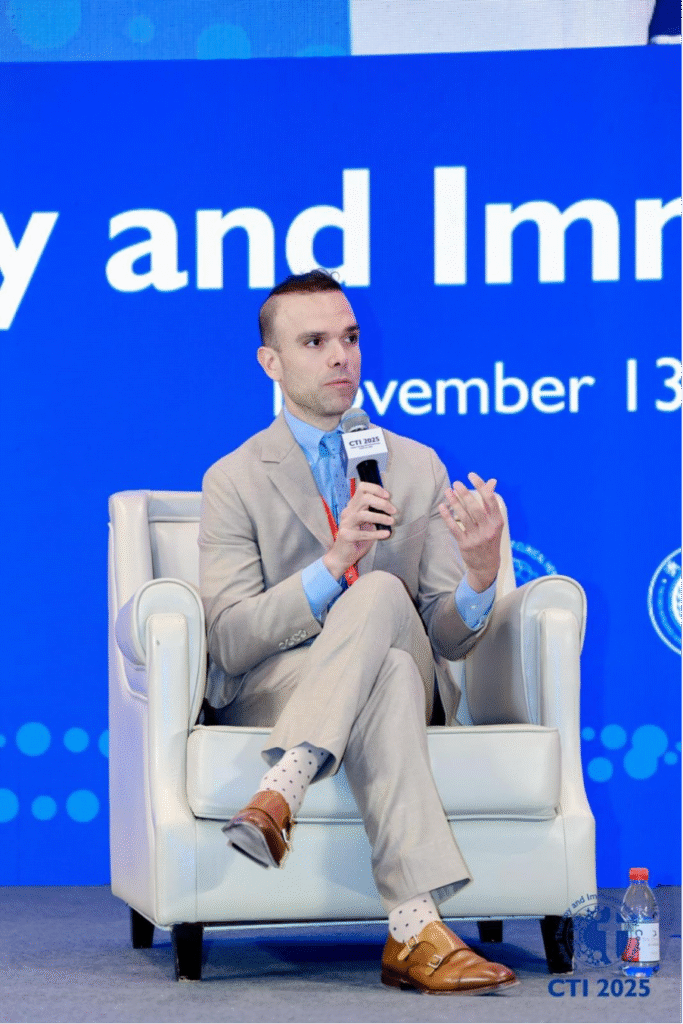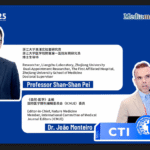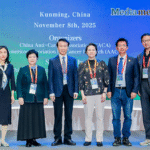
In today’s rapidly evolving biomedical landscape, cell therapy has emerged as a major breakthrough direction and a focal point of global scientific inquiry. Against this backdrop, during the 2025 International Cell and Immunotherapy Congress (CTI 2025), Professor Shanshan Pei of Liangzhu Laboratory and the First Affiliated Hospital of Zhejiang University School of Medicine engaged in a scholarly dialogue with Dr. João Monteiro, Editor-in-Chief of Nature Medicine. Their discussion not only reviewed the developmental trajectory of cell therapy but, through the lens of one of the world’s top medical journals, also offered deep insights into strategic directions for the future. The conversation encompassed objective reflections on existing achievements, penetrating analysis of current bottlenecks, and meaningful guidance for scientists seeking to advance research in the field.
Field Landscape
Remarkable Progress, Challenges Ahead
To explore the scientific landscape of cell therapy, Professor Pei invited Dr. Monteiro to review past milestones and future directions from the perspective of a journal editor-in-chief.
Dr. Monteiro noted that cell therapy is in a phase of rapid expansion. While transformative success has been achieved in hematologic malignancies, the central challenge now lies in expanding indications. Specifically, the key question is how to extend the validated success seen in blood cancers to solid tumors, which remain much more difficult to treat.
At the same time, developing therapies that achieve comparable efficacy with lower toxicity is an important strategic priority. Dr. Monteiro highlighted that reducing the required number of therapeutic cells not only lessens patient burden but also has profound implications for cost control and broader accessibility.
Despite significant progress, the proportion of patients who truly benefit from innovations such as CAR-T cell therapy remains limited. Therefore, expanding the clinical reach of these cutting-edge treatments is an urgent task for the field.

Mechanistic Insights
Multi-omics Integration Fuels Precision Medicine
Addressing the deeper mechanistic understanding of cell therapies, Professor Pei asked Dr. Monteiro about the role of multi-omics technologies. Monteiro emphasized that beyond improving clinical outcomes, unraveling mechanisms of action is scientifically essential for driving therapeutic innovation.
As the number of patients receiving CAR-T therapy grows, so does the availability of clinical data—opening opportunities for studies that were previously impossible due to limited sample sizes. By integrating transcriptomics, proteomics, and other multi-omics layers with clinical outcome data, researchers can systematically dissect efficacy heterogeneity and resistance mechanisms.
Monteiro underscored that transforming real-world treatment data into mechanistic knowledge represents a core pillar of precision medicine, helping to close the gap between basic research and clinical application. This paradigm, he said, will be invaluable for accelerating progress across the field.
China’s Contribution
Growing Volume, Rising Quality, Vast Potential
Turning to China’s position and prospects in global cell therapy research, Professor Pei invited Dr. Monteiro to comment based on the journal’s global submission portfolio.
Monteiro observed that China’s research output and scientific quality in cell therapy and other frontier areas have risen dramatically in recent years, making it a major force in the international scientific community. Among cell-therapy-related clinical trial submissions received by Nature Medicine, China now contributes the largest share—with work spanning senior investigators to early-career researchers, reflecting a healthy and dynamic scientific ecosystem.
This momentum is supported by China’s continuous investment in research infrastructure and talent development, laying a strong foundation for generating more globally influential, high-quality work in the future.
In terms of improving acceptance rates in top journals, Monteiro stressed that rigor and adherence to international research standards are essential. Strict compliance with global clinical research guidelines—including prospective trial registration—is a fundamental prerequisite for publication. Unfortunately, unfamiliarity with these processes still leads some authors to encounter avoidable obstacles during submission.
Robust primary data, reproducibility, and transparent reporting are also critical elements in the peer-review process. Only with rigorous methodology and reliable data can research be recognized by leading international journals.

Innovation at the Forefront
AI Integration Accelerates Translational Progress
Dr. Monteiro also discussed how Nature Medicine differentiates itself from other leading journals such as The New England Journal of Medicine and The Lancet. While their scopes overlap, Nature Medicine places particular emphasis on innovation and translational potential. The journal especially values work that represents a true step forward from basic discovery to clinical applicability.
Ideal submissions address unmet clinical needs and demonstrate both conceptual novelty and rigorous design—whether through new targets, new modalities, or new therapeutic mechanisms. The key is that these innovations are validated in genuine clinical contexts. This balance of innovation and practicality forms the journal’s distinct academic identity.
Near the end of the discussion, Professor Pei inquired about the prospects of artificial intelligence in medical research. Dr. Monteiro noted that AI has already become deeply embedded in nearly every stage of scientific inquiry, enabling researchers to tackle complex questions previously out of reach. The number of AI-related submissions to Nature Medicine continues to grow, including many strong contributions from Chinese investigators, spanning mechanistic studies to clinical applications.
Monteiro predicted that AI will continue to accelerate rapidly and soon become an indispensable core tool in both medical research and daily clinical practice.
Conclusion
The in-depth dialogue between Professor Shanshan Pei and Dr. João Monteiro covered not only core issues such as efficacy optimization and mechanistic elucidation in cell therapy, but also critical practical topics such as translational application and scientific publishing. Monteiro’s insights, grounded in global perspective yet attuned to the realities of Chinese research, offer valuable guidance to scientists across the field.
Cellular immunotherapy is now transitioning from “breakthrough for a few” to “benefit for many.” Researchers in China and worldwide must seize the momentum of technological innovation, strengthen methodological rigor, and uphold scientific standards to address unmet clinical needs. The academic philosophy and practical experience shared in this conversation will help foster deeper global collaboration and high-quality development, contributing meaningful advances toward conquering challenging diseases.



Expert Profiles

João Monteiro, M.D., Ph.D.
Editor-in-Chief, Nature Medicine
Dr. João Monteiro received his medical training and Ph.D. from the Federal University of Rio de Janeiro, where he studied mechanisms of self-tolerance to autoantigens in autoimmune diseases.
He received the Pew Latin American Fellowship in Biomedical Sciences in 2009, and subsequently conducted research at the U.S. National Institutes of Health with Dr. Ron Germain, focusing on T-cell antigen recognition and the dynamics of immune responses in vivo.
From 2013 to 2017, he served as a Senior Editor at Cell in Immunology and Translational Medicine. In December 2017, he was appointed Editor-in-Chief of Nature Medicine, leading a team of editors and journalists covering translational and clinical research worldwide.
He has spoken widely at international conferences on medicine, science, and publishing, advocating for higher ethical and transparency standards in translational and clinical reporting. He also champions opportunities for young scientists and promotes inclusive scientific publishing to reduce global health disparities.
Since 2021, he has served on the International Committee of Medical Journal Editors (ICMJE).

Shanshan Pei, Ph.D.
Liangzhu Laboratory & First Affiliated Hospital, Zhejiang University School of Medicine Zhejiang University Hundred Talents Program • Doctoral Supervisor
Professor Shanshan Pei is a researcher at Liangzhu Laboratory and a dual-appointed faculty member at the First Affiliated Hospital of Zhejiang University. He is a recipient of national and provincial young-talent awards, holding a bachelor’s degree from the University of Science and Technology of China and a Ph.D. from the University of Rochester, USA.
He completed postdoctoral training under leukemia stem cell expert Professor Craig Jordan at the University of Colorado, where he later served as a Research Assistant Professor.
For more than a decade, his work has focused on acute myeloid leukemia (AML) and leukemia stem cells (LSCs), making multiple original contributions to areas such as venetoclax resistance and LSC heterogeneity.
His representative first-author and corresponding-author papers have been published in Cancer Discovery (2023, 2020; both ESI Top 1% highly cited), Cell Stem Cell (2018), and other leading journals.
He has published over 30 SCI papers with more than 6,500 citations. He has received the AACR Highly Cited Paper Award, the ASH Abstract Achievement Award, and has delivered numerous invited talks at international conferences. He serves as a reviewer for journals including Cell Stem Cell, Blood, and Blood Cancer Discovery.


